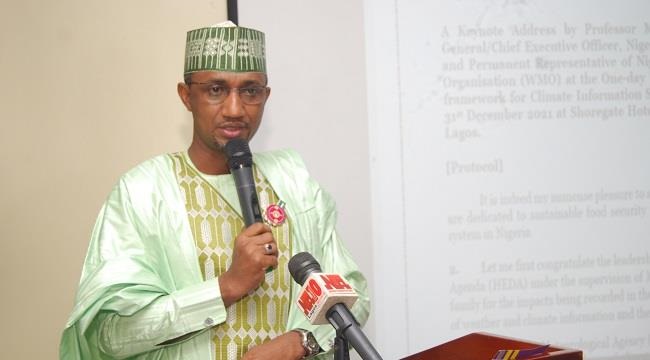Professor Mansur Bako Matazu, the Director General/Chief Executive Officer, Nigerian Meteorological Agency (NiMet), and Permanent Representative of Nigeria with the World Meteorological Organisation (WMO), at a recent forum in Lagos on “Developing a feedback framework for Climate Information Service Delivery in Nigeria”, sheds some light on the organisation’s functions and achievements, saying that NiMet has immensely benefitted from collaborations with other bodies, and remains open to more partnerships

In Nigerian Meteorological Agency (NiMet), with over 130 years of existence, we have generated robust database of climate information across every part of our dear nation. Meteorological stations (conventional and automatic) are situated in every State of the Federation including the Federal Capital Territory.
As a Federal Government Agency with a vision is to be a world class provider of weather and climate services for safety and sustainable national socio-economic development, we provide services across multiple sectors of the Nigerian economy including Agriculture, Aviation, Telecommunications, Power & Energy, Building and Construction, Oil & Gas, Disaster Risk Reduction & Management, Education, Defense, Marine & Maritime, Health, Finance & Insurance, among others.
It is important to recognise the position of the Federal Government of Nigeria on developing the Agricultural Sector for Sustainable Green Economy, focusing on food system development agenda that will lift 100 million Nigerians out of poverty within a decade. The Government aims to prioritise healthy diets and affordable nutrition through inclusive, efficient, resilient, and sustainable agriculture which will contribute to job creations and sustainable economy growth.
The global food system is the “production, processing, and distribution of food throughout the world.” In October 2021, the World Meteorological Organisation (WMO) through “The State of the Climate in Africa 2020” reiterated the effects of changing precipitation patterns, rising temperatures and increased frequency of weather extremes, and their contributions to mounting food insecurity, poverty, and displacement in Africa.
Similarly, the Food and Agriculture Organisation (FAO) identifies weather extremes as key drivers that affects four dimensions of food and nutrition security: These are: availability of food, economic and physical Access to food, food utilisation to reach a state of nutritional well-being, and the stability of the previous three dimensions over time.
However, our current food system is rife with inequalities and issues that prevent adequate food security for all with grave consequences. The prospects of Agrometeorological services are enormous across the value chain from land preparation through harvesting to marketing and storage with the support of key players such as farmers, extension officers, input providers, banks, insurance company, transporters etc.
NiMet has been in the forefront of providing early warning services. Various weather and climate information generated by NiMet are available for clients and stakeholders across the socio-economic sectors of the country.
To ensure these products and services reach the required destinations and achieving desired impacts, NiMet relies on Partnerships. With collaborations, we have been able to reach out to multiple clients over the years with attendant testimonies and positive feedbacks. One of such partnerships is the one with Human and Environmental Development Agenda (HEDA) which began in 2018 and has culminated to this day.
The objective of this partnership was to engage stakeholders on their role in co- production and co-ownership of Agrometeorological products for effective understanding and efficient utilisation of the products as promoted by NiMet and the WMO. It also affords NiMet a platform to develop a sustainable communication channel to the end- users and appreciate further the needs from stakeholders.
NiMet understands the need for partnership in the dissemination of climate information to farmers based on the success stories recorded with HEDA. This of course, is in addition to other collaborations with partners over the years.
The agency maintains a strong and efficient collaboration with Federal Ministry of Agriculture and Rural Development, Institute of Agricultural Research (IAR) on Climate Smart Villages, International Institute of Tropical Agriculture (IITA) on Climate Smart Agricultural Practices, Centre for Dry-Land Agriculture (CDA), USAID MARKET, state governments, and other key MDAs in providing Agrometeorological information to farming communities across the country.
The key challenge in the delivery of Agrometeorological information to farmers include traditional believes, highly technical scientific information, poor communications, language barrier etc. Hence, the essence of collaborative partnerships such as the NiMet-HEDA relationship.
The NiMet remains open to more of these partnerships and look for forward to improved working relationship with HEDA for sustainable food security in Nigeria.
